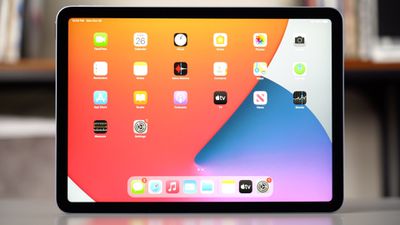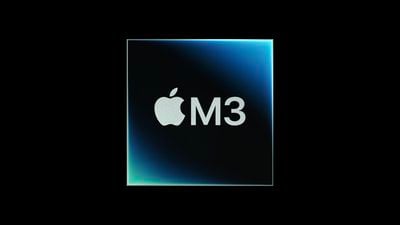iPad Air
Apple's iPad Air is the middle-tier iPad starting at $599 in 11-inch and 13-inch size options.

Should You Buy an iPad Air?
The iPad Air is Apple's mid-range tablet, offering many key iPad features like Touch ID, M3 chip performance, and a range of color options at prices starting at $599. Refreshed in March 2025, the iPad Air is at the beginning of its product cycle and now is a good time to buy. Apple does not refresh the iPad Air on an annual basis, and no new model is coming in 2025.
The iPad Air is the sweet spot in Apple's iPad lineup, but for those who want a smaller tablet, there is the iPad mini, which still offers many of the iPad Air's features in more portable form factor. Users who are looking for a more affordable option should consider the 11th-generation iPad. Starting at $349, the iPad offers several iPad Air features, such as Touch ID and a Retina display, but at a lower price that balances functionality and affordability.
On the other hand, for iPad models with more advanced display, improved performance, and high-end features, there is the iPad Pro. The iPad Pro takes the iPad Air's features to the next level, adding an OLED display, up to 16GB of memory, Face ID, ProMotion, an M4 chip, and more. It is aimed at professional users who need more power and higher-end display options.
If you're planning to get an iPad Air or another iPad, make sure to check out our iPad deals guide, where we aggregate the best prices of the month.
2025 iPad Air
Contents
Apple in March 2025 updated the iPad Air with two seventh-generation models, adding updated M3 chips to the lineup. The iPad Air continues to be available in 11-inch and 13-inch sizes, much like the iPad Pro, and there were no design changes in 2025. Priced starting at $599, the iPad Air is Apple's middle-of-the-road option, as it is more affordable than the $999+ iPad Pro but more expensive than the $349 11th-generation iPad.
The smaller iPad Air features an 11-inch edge-to-edge display with a 2360x1640 resolution, while the larger iPad Air has a 13-inch edge-to-edge display with a 2732x2048 resolution. The iPad Air is equipped with an LCD "Liquid Retina" display that is a step down from the OLED display in the iPad Pro. Compared to the iPad Pro, the iPad Air is thicker, heavier, and has thicker display bezels.
The iPad Air has an aluminum chassis that has flat sides and rounded edges that wrap around the fully laminated display. True Tone support is included for adjusting the display to match the ambient lighting, as is P3 wide color, 500 nits brightness for the 11-inch model and 600 nits for the 13-inch model, and 1.8 percent reflectivity. It does not feature ProMotion support.
Apple's iPad Air was the first iPad to offer unique color options similar to iPhone colors, and the 2025 iPad Air comes in Space Gray, Purple, Blue, and Starlight. The iPad Air features a Touch ID sensor integrated into the top button rather than Face ID like the iPad Pro. Other than being built into the top button instead of a Home button, the Touch ID functionality is the same as other devices that have featured Touch ID.
Compared to the 2024 model, there are no design changes or other internal updates except for the M3 chip that's inside. The M3 chip is built on TSMC's 3nm process, which means it is more powerful and efficient than the prior-generation M2.
The M3 chip has 28 billion transistors, up from 25 billion, and it features an 8-core CPU and a 9-core GPU. The M3 outperforms the M2 by approximately 17 percent for single-core tasks and 21 percent for multi-core tasks. The GPU is up to 15 percent faster, and there is up to 100GB/s memory bandwidth.
The 12-megapixel front-facing FaceTime camera features Center Stage support, and there is a 12-megapixel ƒ/1.8 rear camera. The iPad Air includes stereo speakers in landscape mode for wider stereo sound when watching video.
Cellular iPad Air models are compatible with 5G networks, but support is limited to the slower and more widespread sub-6GHz 5G networks. Storage starts at 128GB, but can be upgraded to as much as 1TB. Other features include Wi-Fi 6E and Bluetooth 5.3.
The iPad Air has a USB-C port with up to 10Gbps data transfer along with support for connecting cameras for downloading images, hard drives, and 4K external monitors. The iPad Air ships with a 20W USB-C adapter for charging purposes.
Like the iPad Pro, the iPad Air supports the $129 Apple Pencil Pro and it works with a new Magic Keyboard for iPad Air. The Magic Keyboard attaches to the iPad Air magnetically, with the Smart Connector providing power and data with no need for Bluetooth. Compared to the prior-generation keyboard, the new model has a larger trackpad and function keys.
Note: See an error in this roundup or want to offer feedback? Send us an email here.
How to Buy
The iPad Air can be ordered from the online Apple Store and other retailers. The 11-inch model is priced starting at $599, and the 13-inch model is priced starting at $799.
Reviews
Reviewers didn't have a lot to say about the 2025 iPad Air, because it's essentially the same as the prior-generation iPad Air with the exception of the internal chip. The 2025 refresh was not exciting, and as one reviewer from CNET said, "it's hard to think of a time I was less excited about an iPad update."
The design hasn't changed, and the colors are the same, and the LCD display hasn't been updated either. But the M3 chip is faster than the M2, and it supports console quality games. Reviewers didn't notice much of a difference between the M2 and M3 in day-to-day use, though.
Both the 11-inch and 13-inch models have long lasting battery life, which reviewers highlighted, and support for the latest Apple Pencil Pro. Reviewers liked the new Magic Keyboard for iPad Air, but pointed out that it doesn't have some of the features of the iPad Pro keyboard, like the aluminum outer shell and backlit keys.
The iPad Air has a Touch ID side button, and reviewers said that it continues to be more inconvenient than Face ID, which the iPad Pro offers.
Most reviewers prefer the 11-inch size to the 13-inch size for portability purposes. The 13-inch model is more unwieldy and heavier, but the 11-inch model is a good size for daily use.
Design
The 2025 iPad Air is identical to the prior-generation model, and there have been no design changes to either model. You can get the iPad Air in an 11-inch screen size, or a 13-inch screen size, just like the iPad Pro.

The iPad Air has an edge-to-edge display with slim bezels, and an aluminum chassis with flat sides and rounded edges that wrap around the screen. Compared to the iPad Pro, it has a thicker body, thicker bezels around the display, and it weighs more.
The 11-inch iPad Air measures in at 9.74 inches (247.6 mm) long, 7.02 inches (178.5 mm) wide, and 0.24 inches (6.1 mm) thick. It weighs 1.01 pounds (460 grams). The 13-inch model is 11.04 inches (280.6 mm) long, 8.46 inches (214.9 mm) wide, and 0.24 inches (6.1 mm) thick. It weighs 1.36 pounds (616 grams).

With the all-display design, there is no Touch ID Home button, but Apple has not added Face ID to it. Instead, the iPad Air has a Touch ID fingerprint sensor built into the top power button. It scans a fingerprint like a Touch ID Home button, but it is smaller and more compact.
The Touch ID top button works just like the Touch ID Home button on older models and it can be used to unlock the iPad, access apps, make purchases with Apple Pay, and more. Touch ID on the iPad Air is functional in both portrait and landscape orientations.
There is a front-facing camera on the landscape top edge of the iPad Air for FaceTime calls. Speakers and a microphone are located at the top of the iPad Air adjacent to the Touch ID button, while the right side features features volume up/down buttons and a magnetic space for charging the Apple Pencil.

At the back, there's a single rear camera with a microphone. Stereo speakers and a USB-C port are located at the bottom of the iPad Air.
The iPad Air is available in four colors, including Space Gray, Purple, Blue, and Starlight.
Display
While the iPad Pro models have OLED displays, the iPad Air models use more affordable LCD displays that Apple calls Liquid Retina. The Liquid Retina displays do not support 120Hz ProMotion display technology, and are limited to 60Hz refresh rates.
The 11-inch iPad Air has a resolution of 2360 by 1640 at 264 pixels per inch. The 13-inch model has a resolution of 2732 by 2048 pixels at 264 pixels per inch. The 11-inch version supports up to 500 nits brightness, while the 13-inch model supports up to 600 nits brightness.

Both models offer P3 wide color support for rich, true-to-life colors, an anti-reflective coating with 1.8 percent reflectivity, and True Tone support that adjusts the white balance of the display to match the ambient lighting of the room.
M3 Apple Silicon Chip
The biggest update to the 2025 iPad Air is the M3 chip inside, which is an upgrade over the prior-generation M2 chip. The M3 chip is built on Apple's 3-nanometer process, while the M2 chip was built on a 5-nanometer process. An upgrade in process typically means a chip is smaller in size with better performance and efficiency.

When the M3 chip first came out in the MacBook Pro, Apple said that it represented the "biggest leap forward in graphics architecture ever for Apple silicon" with faster and more efficient GPU technology. The M3's GPU supports Dynamic Caching, hardware-accelerated ray tracing, and mesh shading, for console-quality gaming on the iPad.
Dynamic Caching allocates the use of local memory in hardware in real time, so only the exact amount of memory needed is used for each task. It increases the average utilization of the GPU, thereby increasing performance for demanding pro apps and games.
With hardware-accelerated ray tracing, light looks more realistic as it interacts with a scene, allowing for more physically accurate images. Game developers can use the ray-tracing and mesh shading for more accurate shadows and reflections as well as more efficient geometry processing.
The M3 chip is up to 17 percent faster than the M2 chip in single-core performance, and up to 21 percent faster in multi-core performance. GPU performance is up to 15 percent faster. Benchmark results for the M3 in the iPad Air confirm that the M3 is around 18 percent faster than the M2 in the prior-generation model. The iPad Air earned an average multi-core score of 11,605.
It is worth noting that the chip in the iPad Air has an 8-core CPU and a 9-core GPU, while other M3 machines use a 10-core GPU. Apple is likely using binned chips for the iPad Air, making use of chips that were not up to snuff for the MacBook Pro and MacBook Air.
Neural Engine
There's a 16-core Neural Engine built into the M3 chip that handles AI tasks and boosts camera performance alongside the custom image signal processor, plus there's a display engine.
Storage
The iPad Air starts with 128GB of storage, but there are also 256GB, 512GB, and 1TB upgrade options.
Front-Facing Camera
There is a 12-megapixel front-facing Ultra Wide camera that is located at the landscape top edge of the device. The camera location means the camera is in an upright orientation when the iPad Air is used in landscape mode with a keyboard.

The camera supports Center Stage, a feature that automatically keeps users perfectly framed during video calls. Center Stage can pan to keep users in the shot as they move around. Other supported features include Portrait mode, Portrait lighting, and Animoji and Memoji.
Rear Camera
There is a 12-megapixel Wide camera on the rear of the iPad Air, with support for Live Photos, 5x digital zoom, 63-megapixel panoramas, wide color capture, noise reduction, Smart HDR 4, burst mode, Live Photos support, and auto image stabilization.

Up to 4K video recording is supported at 24 fps, 25 fps, 30 fps, or 60 fps, and the camera also offers 240-fps slo-mo video recording.
Battery Life
Both iPad Air models offer "all-day" 10-hour battery life. The 11-inch iPad Air has a 28.93-watt-hour battery and the 13-inch model has a 36.59-watt-hour battery.
Other Features
Ports and Smart Connector
The iPad Air has a USB-C port for charging, but the USB-C port can also be used to connect to up to a 6K external display, cameras (downloading images only), and other USB-C devices. The USB-C port supports 10Gbps data transfer and is able to charge an iPhone or Apple Watch with the right cable.
The Smart Connector at the back of the iPad Air allows it to communicate with and power accessories like the new Magic Keyboard for iPad Air. The Smart Connector interface is able to transfer both power and data, so accessories that connect to the iPad Air using the Smart Connector do not need to have batteries.
Speakers and Microphone
There are two microphones in the iPad Air, along with two landscape stereo speakers that support spatial audio. Apple says the 13-inch model has double the bass for even better sound quality.
Connectivity
The iPad Air supports Wi-Fi 6E for 2x increased performance compared to the prior model, Bluetooth 5.3, and sub-6GHz 5G. Cellular versions of the iPad do not have Apple's C1 modem, and instead use Qualcomm cellular chips.
Accessories
Apple Pencil Pro
The iPad Air is compatible with the Apple Pencil Pro, which is the most advanced version of the Apple Pencil to date.

Barrel Roll
There is a gyroscope in the Apple Pencil Pro that allows the rotation of the barrel to change the orientation of certain tools. It basically offers much more precise control of shaped pen and brush tools, similar to how a real pen or brush would function when you tilt it while drawing or sketching.
Haptic Feedback
A built-in haptic engine offers haptic feedback when using the Apple Pencil Pro's gestures. A light haptic pulse responds when using a squeeze or double-tap gesture, plus there is feedback when using the snap to a Smart Shape feature.
Find My
Find My is available for the Apple Pencil Pro so it can be tracked right alongside the iPad and other devices in the Find My app.
Charging and Pairing
The Apple Pencil Pro attaches to the side of the iPad Pro or the iPad Air, and the magnetic connection enables automatic pairing and charging.
Other Features
Other Apple Pencil features like Apple Pencil hover and double tap are supported. Hover lets you preview where the Apple Pencil touches down on the display before a mark is made, while double tap can be used for swapping between tools.
Low latency, tilt sensitivity, and pressure sensitivity are all included features.
Magic Keyboard
Alongside the iPad Air, Apple introduced a new Magic Keyboard that has a larger trackpad and function keys for quicker access to iPad features like display brightness and volume control.
The Magic Keyboard is designed to attach to the iPad Air magnetically, with the Smart Connector on the iPad Air providing power and data, so there's no need for Bluetooth. The keyboard has a USB-C port in the hinge for pass-through charging.

The Magic Keyboard is a folio-style case with a full keyboard and a trackpad, with the keyboard offering 1mm of travel. The Magic Keyboard attaches to the iPad Air through a magnetic connection, and it features cantilevered hinges that allow it to work on a desk or on a lap. The hinges allow for adjustments of the viewing angle up to 130 degrees, so it can be tweaked for every usage situation. The design of the Magic Keyboard allows the iPad to "float" in the air, with the bottom part of the case tilting backward when used in keyboard mode.
When not in use, the keyboard's folio-style design keeps the iPad Air safe, covering the front and back of the device.
Apple's Magic Keyboard for iPad Air is priced at $269 for the 11-inch version and $319 for the 13-inch version.
What's Next for the iPad Air
A future version of the iPad Air could have a display with a 90Hz refresh rate, up from 60Hz. Apple is said to be working on a higher refresh rate LCD display with a new liquid motion panel.
Apple is expected to introduce an OLED display for the 11-inch and 13-inch iPad Air models in 2027.

